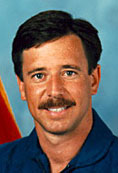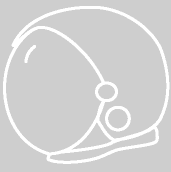|
Scott "Doc" Horowitz
–
astronaut
|

|
"
When selecting astronauts, while technical expertise is important, it
is equally important to select someone who can get in a Winnebago with
six of their friends and go on a camping trip for two weeks and all be
locked in together and live and work in that confined space and come out smiling!"
|

|
| |
|
|
|
| |
How were you originally motivated to become an astronaut? |
| |
I first started flying with my father when I was 6 years old. For
summer vacations we would rent a small airplane and my father, two
brothers, and myself would fly around the country. I was also very
interested in model airplanes. I started building free–flight gliders
and eventually worked up to radio–controlled, powered model airplanes.
By the time I was in 6th grade I had designed and built my own models
and had learned to takeoff and land the real thing.
My father is an electrical engineer and was transferred around the
country. I was born in Philadelphia but moved to Daytona Beach,
Florida, when I was in the 1st grade where I remember watching the
Gemini launches. After that we moved to Arizona for a couple of years
but then moved to Indian Harbor Beach, Florida, when I was in the 4th
grade. By then the Apollo program was in full swing and I was
fascinated with the launches of the Saturn V. We moved once again to
California when I was in the 6th grade.
By the time I was in 6th grade I was extremely interested in flying,
science, and exploration. That was also the year of Apollo 11. My 6th
grade teacher, Mr. Smith, wrote a note (which I still have) that said
"With your will and determination you may become one of the astronauts
of tomorrow." That's when I decided that I wanted to be an astronaut.
|
|

|
| |
|
|
|
| |
What qualities are important in becoming a first-class astronaut? |
| |

|
|
Astronauts come from a variety of backgrounds. There are two basic
classifications of astronauts: Astronaut–Pilot and Astronaut–Mission
Specialist. All of the Astronaut–Pilots are military test pilots.
These astronauts have advanced degrees in science and engineering and
have spent years flying high performance military aircraft before being
selected to test pilot school (either Air Force or Navy test pilot
school). They then complete 1 year of test pilot school and have spent
time testing new aircraft and systems for the military before being
selected by NASA to become Astronaut–Pilots. The Mission Specialists
all have excelled in technical areas that range from Astrophysics to
Biochemistry and all engineering and science disciplines in between.
These astronauts have Masters degrees and Phds and have excelled in
their fields.
The most important qualities common to both types of astronauts are
those that make a good explorer. These people are well rounded and most
enjoy outdoor activities like mountain climbing, camping, and other
sports. Most are aviation enthusiasts and have civilian pilot ratings
and many have built their own experimental airplanes. They all work
well in team endeavors and welcome new challenges. When selecting
astronauts, while technical expertise is important, it is equally
important to select someone who can get in a Winnebago with six of their
friends and go on a camping trip for two weeks and all be locked in
together and live and work in that confined space and come out smiling!
|
|
| |
|
|
|
| |
What ideas can you suggest for a future human community on Mars?
|
| |
For the first human community on Mars to succeed will require many
technical and personal triumphs. There are, however, two major
requirements upon which all others depend: skills and power. The
astronauts who venture to Mars will collectively need to possess the
skills required to overcome the many obstacles that may confront them,
these skills include but are not limited to: mechanic, leadership,
electronic technician, saint, engineer, pilot, medical, computer expert,
scientist, athlete, machinist, cook. These are the same skills required
of early explorers of our own planet. The second requirement is power.
Without sufficient power the astronauts who venture to Mars will be
unable to perform meaningful exploration, overcome unforeseen problems,
or even survive.
|
|

|
|




